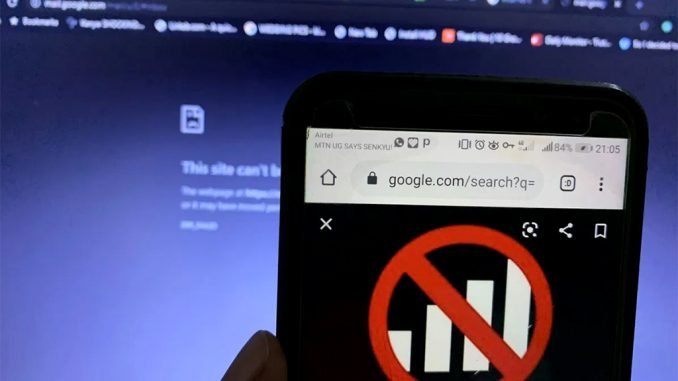
Kampala, Uganda | URN | Maverick city lawyer Hassan Male Mabirizi petitioned the court on Friday 22, January 2021 to compel telecoms to refund money for unused data, but IT experts think the Ugandan government could have avoided such developments by seeking advice from professionals.
According to Mabirizi, millions of internet users had spent billions of Shillings to buy data bundles from telecom companies when the government directed them to shut down the internet, leaving the country in a total blackout.
Apart from the individuals who use the internet to chat on social media with friends and relatives, the platforms have increasingly become an important part of businesses both small and big.
According to the Uganda Communications Commission [UCC], there are about 21 million mobile phones connected to the internet and of these, 10 to 14 million access social media via mobile broadband (internet on a mobile phone).
Uganda’s largest mobile telecom MTN alone realized close to Shillings 28 billion on average per month or Shillings 900 million per day between January and June this year, from its 3.3 million internet users.
Mabirizi wants the companies to refund the month he and other subscribers gave to the companies between January 12th and 18th, 2021. Many had also paid Uganda Revenue Authority [URA], the Over the Top Tax-OTT, sure of accessing the platforms throughout.
These included thousands of Ugandans who are using social media platforms mainly Facebook and WhatsApp to market their businesses, locally and internationally.
Large organisations are also increasingly digitizing their operations including payrolls, procurement, stock-management and production. But there are also technology companies like financial transfer companies and online businesses among others.
James Wire, a technology and business consultant says the focus has been mainly put on large organisations especially banks, yet multitudes of small enterprises, which are termed “the backbone of the economy,” have lost lots of business.
The government has since said it switched off the internet to prevent some people especially in the opposition from causing insecurity in the country. It insists that some of them are harbouring these ideas and have openly made the threats.
Since early this week, there has been limited internet access with most Ugandans able to access it using the Virtual Private Networks [VPN], a kind of connection that establishes a secure connection between you and the internet, disguising your address or location.
Read Also: Can social media activism be successful in Uganda?
This makes it hard for regulators to track the user, who, at this time is able to manoeuvre around regulation. The government has since Thursday 21st warned that using VPNs is illegal and there could be a crackdown on those using them.
Unfortunately, more people had embraced the calls by the government to adopt digital systems and methods to do businesses since the COVID-19 pandemic had disrupted the movement of persons, while close contact had also become more dangerous.
Wire advises that rather than stifle businesses there are ways that the government could have used to prevent misuse breach of security if it had consulted the experts.



